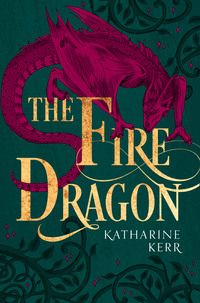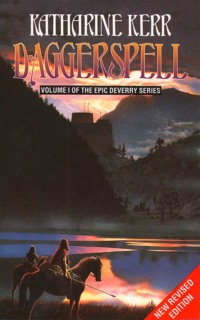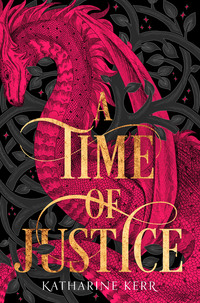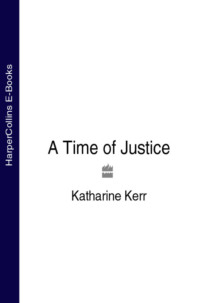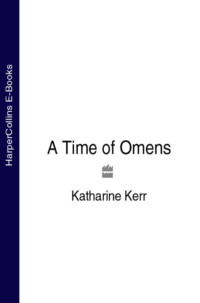
Полная версия
The Black Raven
Niffa felt tears burn her eyes. She tried to wipe them away, but they spilled over and ran. Kiel flung one arm around her shoulders and pulled her close.
‘Hush, hush!’ he said. ‘Even if Raena did hang in the market square, would it bring our Demet back? Here, here, little sister! It aches my heart to see you so sad.’
Slowly the tears stopped. Niffa wiped her face on her sleeve and grabbed a twist of straw from the floor to blow her nose. She tossed the twist into the fire and watched it flare. May Raena burn with shame just as the straw burns! She looked up to find Lael watching her, one eyebrow raised, as if he knew she worked a wishing charm.
‘I do wonder one thing,’ Dera said. ‘What does Werda think of all this talk of spirits?’
‘I know not,’ Kiel said. ‘A fair bit, I should think.’
Later that same day Niffa learned Werda’s opinions on the matter. Lael and Niffa were sitting by their fire, while Dera lay tucked up in the big bed across the room to rest. Kiel had already gone to sleep in the other room, since he would be standing watch on the town walls again that night. At the door someone knocked in a loud quick drumming. Niffa ran to open it and found Werda, followed by her apprentice. She was a tall woman, Werda, and lean as well, all long bones and sharp angles, muffled up that morning in her white ceremonial cloak. Athra, her apprentice, wore an ordinary grey cloak, splashed here and there with whitewash, doubtless from the large bucket of the stuff that she was carrying. Athra’s face gleamed with ointment, thick smears of lard flecked with some sort of herb from the smell of it. Blonde and round, Athra had the sort of rosy skin that chaps from a wrong look.
‘Come in quick,’ Niffa said. ‘Do take of the warmth of our fire.’
‘My thanks,’ Werda said. ‘It be powerful cold still.’
All three of them trooped in. Athra set herself and her bucket down by the fire, but Lael insisted that Werda take their only chair. She sat and for a moment busied herself with untying the hood of her cloak and pulling it back.
‘How do you all fare?’ Werda said finally.
‘We all be well at long last,’ Lael said, glancing Dera’s way. ‘Thanks to the gods and to Gwira’s herbs.’
Werda nodded unsmiling. For a moment the silence held as she sat looking back and forth twixt Lael and Niffa.
‘There be no use in polite chatter,’ Werda said finally. ‘I did come to see you, young Niffa. No doubt you’ve heard of the evil spirit loose in town?’
‘I have,’ Niffa said. ‘They say it did kill my Demet.’
‘Is it that you believe this?’
Niffa hesitated, gauging the black look on her father’s face. She was aware of Athra watching her from one side and Werda from the other.
‘I know not if I believe or disbelieve,’ Niffa said. ‘Think you it be the case?’
‘I do. I did see that woman of the councilman’s with my own eyes, and I talked a long time with Gwira and Korla about her faint. Truly, naught else could have caused her trouble but spirit possession. And then I did walk about the councilman’s house and compound, and there be spirits there, sure enough. I did feel them like a tingling in the air round the walls. With the witch-vision the gods give me, I did see an evil thing: a creature much like a stork, but it had the arms and face of a man.’
Lael swore under his breath. Niffa clasped her hands together so hard they ached.
‘Huh!’ Werda said. ‘You’ve gone pale, lass, and I blame you not, quite frankly. I did come to ask if these spirits, they’ve been a-troubling you.’
‘They’ve not.’
‘Good.’ Werda rose, gathering her cloak around her. ‘If you do feel the slightest alarm, then come to me straightaway. I care not if it be in the middle of the night, young Niffa. You find yourself a lantern, Lael, and bring your daughter to my house. Do you understand me?’
‘I do,’ Lael said.
‘But I don’t understand,’ Niffa said. ‘Why would they come plaguing me?’
Werda merely looked at her with a twist to her mouth, as if she were wondering how Niffa could be so stupid. Lael sat like stone, but Niffa knew he was watching her. Her mouth went so dry she couldn’t force out one word.
‘Ah well,’ Werda said at last. ‘The time will come when you’ll not be able to deny the truth. When it does, you come to me, and we shall talk.’ She turned to Lael. ‘Master Lael, I wish to paint a warding on the outside of your door. I do trust you’ll not object.’
‘Of course not.’ Lael got up and bowed to her. ‘If there be aught I can do –’
‘Nah, nah, nah. Today we’ll do naught but prepare the door.’ Werda nodded at Athra and the bucket. ‘On the morrow we’ll be back to work the charm, once the whitewash does dry.’
‘Well and good, then. Will you be painting such on the entire town?’
‘We won’t.’ Werda paused for a significant look Niffa’s way. ‘Only on the public places, the council house and suchlike, and then on those few homes that I do deem vulnerable.’
They went out, and Lael closed the door and latched it against the wind while Niffa mended up the fire again. They could hear Werda through the door, instructing Athra, and the soft whisk of the brush. Until the holy woman and her apprentice had finished, no one said a word. At the sound of their leaving, Dera sat up in bed and ran her hands through her hair to push it back from her face.
‘You did well, lass,’ Lael said to Niffa.
Dera nodded her agreement. Niffa managed a brief smile and stood up.
‘I be weary again,’ Niffa said. ‘I’d best go lie down.’
‘Ai, my poor lass!’ Dera said. ‘It does seem that all you do is sleep.’
‘Mayhap. But this news – whose heart wouldn’t it weary?’
In the long weeks since Demet’s death, Niffa had indeed been hiding from her grief in the refuge of her dreams. Since childhood she had spent her nights in many-coloured kingdoms of sleep, had longed for sleep and dreams and treasured those she remembered upon waking. Now, however, the dreams had become more urgent than the doings of the day. While her parents talked in the great room, she crawled into her blankets, across the room from Kiel, who was snoring worse than the wind in the chimney. In their wooden pen the weasels chirped to her, but she lacked the strength to say a word to them.
As soon as she lay down, she felt as if she’d stepped into a boat and glided effortlessly out into a strange lake, huge and rippled with waves. She dreamt, as she often had, of Demet. Tonight she saw him standing on the far shore of the pale turquoise water. Her boat sailed steadily forward, but the shore just as steadily receded. At last she saw him turn and walk away into the white mists, and her dream faded.
In the middle of the night she suddenly woke. Kiel’s bed lay empty. She could guess that the noise he’d made leaving to go on watch had wakened her. She got up, went to the tiny window, and pulled back the thick hide that kept the wind out. By craning her neck she could just see over the rooftops of Citadel, falling away down to the lake. A sliver of moon hung over the town, and she realized that soon the moon would go into its dark time. It had been full when they’d laid Demet’s dead body out in the forest for the wild things. A half turn of the moon gone, she thought, and my grief rules me still.
All at once she heard someone come into the room. She turned, smiling, expecting to see Kiel, returned for some forgotten bit of his gear. No one was there. The cold draught from the window ran down her back and made her gasp, but she held the hide up nonetheless for the little light the moon gave her. In their pens the ferrets suddenly began rustling the straw. She could recognize Ambo’s chuckle of warning; as their hob he would defend his pack. Someone, something stood in the doorway across the room. She was sure of it, could see nothing – but Ambo must have smelled it, whatever it was. He began to hiss in little moist bursts of sound like a sucked-in breath. Her danger-warning grew stronger. His hissing turned into one long threat. She could hear him rushing around the pen and scattering straw as he searched for this unseen intruder.
Suddenly the presence vanished. Ambo stopped hissing. The other ferrets chuckled, then fell silent; she could hear them all moving in the straw again. The icy air from the window was making her shiver so badly that she let the oxhide fall. In the dark she made her way back to bed and lay down, huddling and shivering under the blankets. She knew that she should wake the house and run to Werda, but the cold had got into her bones, or so she felt, and she couldn’t make herself get out of the warm wrap of her bed.
‘The jeopard, it be gone.’ The voice was Werda’s, but Niffa heard it only in her mind. ‘You may sleep, child.’
Niffa sobbed once. Slowly the ferrets quieted. For a long while she lay shivering, sure that she would stay awake the entire night.
But suddenly she woke to morning and the sound of her mother and father talking in the room just beyond her door. She sat up and looked around. The ferrets lay piled on top of each other, asleep in the straw. Had she dreamt their ghostly visitor and Ambo’s hiss?
‘I do dream so many strange things,’ she muttered to herself.
But Werda’s voice, she knew, had been real, no matter how hard she tried to explain it away. She said nothing to her kinsfolk, but all that morning she noticed them watching her as she sat in her corner by the hearth with one or another of the ferrets in her lap.
Werda returned near mid-day, her arms full of bundles wrapped in rough sacking. Athra trailed after, carrying a big covered kettle. The kettle went by the fire to warm, whilst the bundles got set down carefully on the plank table.
‘The warding black, it does contain pitch,’ Werda said, pointing at the kettle. ‘In this cold weather, it does grow too stiff to use after a bit.’ She considered the bundles for a moment, then picked one up and handed it to Niffa. ‘This be for you. Set it at the head of your bed.’
The bundle contained what at first glance seemed to be an ordinary pottery bowl. When Niffa took it, she could see that in truth it was a pair of bowls, the outer stuck to the inner with more pitch. A thin black line of squiggly decoration covered the inner bowl, starting at the middle of the flat bottom, then winding in a tight spiral out to the rim.
‘It does confuse the spirits,’ Werda said. ‘That line of writing be a spell, and their curiosity does drive them into the bowl to read it, and then they slip between the bowls and cannot find their way out again. Once every some days Athra will fetch the trap away and leave another, that we may deal with the spirits in it once and for all.’
‘My thanks,’ Niffa said, stammering a little. ‘I do ken that I need such.’
‘Indeed?’ Werda looked at her with a twist to her mouth. ‘It gladdens my heart that you do.’
* * *
When the sun hung at the peak of the sky, Verrarc went to the stone council house, which stood on the north side of Citadel’s plaza. In front of it rose a line of stone columns, a reminder of the trees that had surrounded the meeting places of the Ancestors, back before any of the Rhiddaer folk lived in cities. With him Verrarc carried a lit candle in a tin lantern, though the day was bright through thin clouds. At the door he paused to examine the wardings painted on its white-washed surface. Against the fresh whitewash the thick black lines of Werda’s pitch and lampblack concoction stood out sharp and shiny. She had painted a design of two spiral mazes, one above the other, both amazingly intricate, to fascinate the spirits and keep them outside.
When Verrarc went inside, he closed the door carefully behind him. The stone room, with its high ceiling and rank of windows covered only by wooden shutters, was as cold as the open plaza. Earlier, Harl had on his orders laid a fire in the hearth and arranged the council’s round table and chairs in front of it. Verrarc knelt down and used his candle to get the tinder started. A few quick breaths and the kindling caught as well, but Verrarc kept his cloak wrapped around him. The fire would do little but take off the chill.
Chief Speaker Admi joined him in but a few moments, still wheezing from his climb up the steep path to the plaza. He waddled across the room and stood in front of the crackling fire.
‘Good morrow,’ Verrarc said.
Admi nodded and fumbled inside his cloak for a rag to mop his face. When Verrarc pulled out a chair, Admi sank into it with a little nod of thanks in his direction. Verrarc took a chair next to his.
‘Ah, there, my breath returns,’ Admi said finally. ‘Which does remind me. How fares your poor woman?’
‘Better, my thanks.’ Verrarc shuddered as the memory rose of Raena’s dead gaze. ‘Gwira did fear that fever would set in, but Raena, she’s been naught but sleepy. This sort of possession, Gwira did tell me, exhausts the poor soul who suffers it.’
‘No doubt.’ Admi’s fingers twitched in the warding sign. ‘It gladdens my heart that she came to no harm.’
‘My thanks. I do appreciate your nicety of feeling.’
‘Welcome, I’m sure.’
‘If only –’ Verrarc hesitated, but Admi’s eyes were all sympathy. ‘If only my cursed father had let me marry Raena, back before her father did betroth her elsewhere, none of this trouble would have fallen upon us.’
Admi nodded, considering.
‘True spoken,’ Admi said at last. ‘He did think her beneath you – ah. Here be Frie.’
The stocky blacksmith opened the door, then stood half in and half out while he looked over the warding.
‘No use in discussing your woman in front of him,’ Admi whispered.
‘I know,’ Verrarc said, and as softly. ‘It be his wife, she did always hate my Raena.’
Admi raised one eyebrow, then forced out a bland smile. Frie had shut the door; he strolled over, wrapped in a thick grey cloak with his ceremonial scarlet draped on top. His thick dark moustache glittered with frozen breath.
‘Good morrow, Frie,’ Admi said.
‘And to you both.’ Frie sat down across the table. ‘I did stop at old Hennis’s house, and he be too ill to come out in this cold, or so his servants did tell me.’
‘Huh!’ Admi snorted. ‘I’ll wager I know what does sicken him. He does hate to hold his tongue and smile when Werda talks of the gods and spirits.’
‘Can’t understand the man,’ Frie said. ‘Cursed obvious, it is, that the world be full of gods and spirits. Makes you wonder, it does, if his long years be muddling his mind.’
‘Well, now,’ Verrarc put in, ‘he does know the city laws off by heart still. His mind be sound enough on those matters.’
‘True enough,’ Admi said. ‘Now, where be Burra? Late, no doubt, as always.’
Frie grunted his agreement and wiped the melting frost from his moustache with the back of a soot-stained hand.
‘I’d hoped for a little chat among us before the Spirit Talker arrived,’ Admi went on. ‘Which we’ll not have if he doesn’t get himself here soon. I’d best have a private word with him. If he takes not his duty to the town seriously, well, then, there are others who long for a council seat.’
Not long after Burra did arrive, a skinny man with yellow hair, not much older than Verrarc and like him, a merchant who traded in the east. The councilmen barely had a chance at two private words, however, before Werda opened the door and strode in. Her apprentice followed with her arms full of bundled things. The Spirit Talker had bound her grey hair up into braids coiled round her head, and she wore the white cloak that normally she kept for ceremonial occasions. Without waiting to be asked, she pulled out a chair and sat down with her back to the fire. Athra laid her bundles down on the table, then stood behind her master’s chair.
‘I see that Hennis, he deigns not to join us,’ Werda said.
‘Er, just so,’ Admi said. ‘His servants did say that he be somewhat ill.’
‘Huh.’ Werda rolled her eyes. ‘It be a foolish thing to deny the power of the gods. He does get his blasphemies from the Mountain Folk, no doubt. They do mock the spirits, calling them but idle fancies.’
‘Er, mayhap,’ Admi said, ‘but no matter. There be four of us here in attendance upon the council, enough to make our decidings official.’ He paused, glancing around the table. ‘Now, then, by the power invested in me as Chief Speaker, I do open this meeting, come together to discuss the death of Demet, the weaver’s second son. Yesterday morn Verrarc, chief officer of the town militia, did venture that evil spirits did slay the lad. Does any here dispute this finding?’
Frie and Burra shook their heads in a no. Admi turned to Werda.
‘I too agree with Councilman Verrarc,’ Werda said. ‘This night past have I walked round Citadel, and in many a place did I find spirits lurking. These were all weak little things, and I did invoke the gods upon them, and they did flee. No one of them could have slain Demet, but together, in a pack, they would be dangerous.’
‘You have the thanks of the council,’ Admi said, ‘for sending them on their way.’
‘But will they come right back again?’ Frie broke in. ‘That’s what I be wanting to know.’
‘With spirits, it be a constant battle.’ Werda gestured at the bundles on the table. ‘I did bring spirit traps for each of you to take to your dwellings and one to stay here in the council house.’
‘You have our thanks,’ Admi said.
‘Most welcome,’ Werda continued. ‘And now I do ken that I’d best stay on guard against the spirits, which kenning be a weapon in itself. I have my own ways of standing watch.’
The councilmen all nodded as if they understood. Verrarc felt his stomach clench cold. If Raena insisted upon invoking her Lord Havoc again, Werda would be sure to know.
Lael brought Niffa the news of the council’s decision, when, late that afternoon, he carried home the wicker cage of ferrets from their day’s ratting. Niffa took the cage into the other room and released the weasels into their pen; Lael had already taken off their hunting hoods. She came back out to the great room and found him ladling himself a tankard of flat ale from the barrel near the hearth. Dera sat at table, eating a few slices of honeyed apples.
‘Do have some of this,’ she was saying.
‘I won’t,’ Lael said. ‘It be your medicaments, and I’d have you eat the lot, my love.’
Niffa set the empty cage down by the hearth. She was aware of her father watching her with sad eyes.
‘What be so wrong, Da?’ Niffa said.
‘Well, when I were down in town, I did hear the crier. The council, they do say that the matter of Demet’s death be closed. Evil spirits, and Werda, she did sanction their decision.’
Niffa stared down at the straw on the floor and wondered if she were going to weep.
‘Here now,’ Lael said softly. ‘Had they ruled different, he still would have been gone.’
‘Oh, true spoken. But now I’ve naught left of him, but my memories. Not even vengeance – not so much as that for a keepsake.’
Still, she did have one thing more, of course: her dreams. That evening and in those that followed she turned to her childhood refuge, where she could see Demet and pretend that he lived again. In those dreams she would perhaps come into a room and find him sitting there, laughing at her while she reproached him for pretending to die, or perhaps they would walk together by the lake and talk of what they would do come spring. Yet she always knew that she was dreaming, no matter how urgently she wanted the dream to last forever. Other times she would dream they were making love in their bed back in his family’s house, and from those dreams she woke in tears. Yet as time went on, those dreams faded, to be replaced by something far stranger.
Many-towered cities rose in her nights, where she wandered with a lantern in hand while she searched for something she’d lost, though she could put no name to it. At other times she had walked in the city during a summer’s day and marvelled at the strange buildings and the people she saw among them. In the centre of this city rose a hill, circled at intervals by five stone walls. At the top, inside the highest wall, stood a fortress of some kind. In her dreams all she could see were squat towers clustering behind the stone. Sometimes she knew that she had to get into that fortress; in other dreams, she needed to escape it – though paradoxically, she never dreamt of being inside it.
When she woke of a morning, she would lie in bed and marvel at how clearly she saw the dream city. Even though its central hill reminded her of Citadel, the rest of it – the buildings, the people’s clothing – looked nothing like Cerr Cawnen, the only city she’d ever seen. By brooding over the dream images this way she reinforced them, so that the city took a permanent form. Whenever she went back, the same houses and shops would occupy the same locations; the same hill would loom over the familiar streets.
Finally Niffa turned bold. When in her dream she came to its gate, she walked through. All around the city lay meadows where the grass grew as high as her waist, but narrow paths ran through them. She followed one a little ways down the road, stopping often to look back at the towered hill to keep within its sight, but she woke before she’d gone far. Over the next few nights she would walk a little way through these meadows, then rush back to the city before it could disappear. She had learned, just lately, that things you loved could disappear without warning.
Eventually, as she walked through the grass she saw far off to one side something gleaming like fire in the green, but no smoke rose. She left the road and struggled through the grass under a sky growing dim with twilight. Off to her right a huge purple moon trembled on the horizon as night deepened. When she looked back, the city walls still rose nearby, with here and there a point of lantern light upon them. The sight gave her the courage to keep going toward the fire-gleam, a strange red glow like a beacon in the grass.
Two huge five-pointed stars, each taller than a man and twined of stranded red and gold light, hung in the air just above a stretch of beaten-down grass. Between them the earth opened into the mouth of a tunnel sloping down into some unseeable darkness. On the other side of the stars someone was standing in the grass – a woman, judging from her long ash-blonde hair, but she wore tight leather trousers and a tunic rather than dresses.
‘Here!’ the woman called out. You’re not Raena.’
‘And I do thank every god in my heart for that,’ Niffa called back. ‘Who be you?’
The woman walked around the stars and stood looking her over with her hands on her hips. Niffa had never seen anyone so beautiful, or so she thought at first glance. She had silver blonde hair with silver eyes that matched it. Her features were even and perfect – but her ears! They were long and strangely furled like a new fern in spring.
‘My name is Dallandra,’ the woman said at last. ‘And I made these wards to keep Raena away from a thing she seeks. Who are you?’
‘Niffa be my name.’
‘Jahdo’s sister!’
‘And is it that you know our Jahdo?’ In her joy Niffa forgot her fear. ‘Fares he well? Oh please, do tell me.’
‘Well and safe, truly, and you’ll be seeing him in the spring.’
The joy rose like a wave of pure water. All at once Niffa lay awake, tucked into her blankets with a ferret asleep on her chest and grey dawn flooding the window.
‘Tek-tek, whist!’ She shook the ferret awake, then picked her up and put her down on the bed next to her. ‘It’s needful I tell Mam straightaway.’
She found Dera awake, kneeling by the hearth and laying twigs upon blazing tinder. In the big bed at the far side of the room Lael still slept, wrapped around a pillow and snoring. Dera was concentrating on the fire, but she’d apparently heard her daughter approach.
‘Early for you to be up and about,’ Dera said.
‘Mam, I did have the most wonderful dream, and it be one of my true ones, I do know it deep my heart. I did meet a woman who does know our Jahdo. He be safe and well, she did tell me, and he’ll be returning in the spring.’


